- Home
- Jeremy Robinson
Unity
Unity Read online
UNITY
By Jeremy Robinson
Description:
Euphemia Williams, known to her few friends as Effie, and everyone else as Eff-Bomb, will punch you for looking at her funny, for using her full name or for noticing that she’s a genius. But when an elite global entity known as Unity takes note of her intelligence and offers her a chance to escape the hum-drum life of a foster-child, she signs up. At best, she expects her time abroad to be a vacation. At worst, an actual challenge. But what she finds, upon being swept up in a futuristic transport, is far, far worse.
En route to a secret location in the Pacific, a meteor punches through the atmosphere triggering an electromagnetic pulse that sends the transport plummeting to the ocean. While fighting to escape the crash and climb onto an island beach, the meteor slams into the sea. A tsunami races across the island, pursuing Effie and her fellow survivors deeper into the volcanic island’s lush jungle.
Beaten, terrified and abandoned, the small group discovers that they are not alone on the island. The locals are ruthless and well-trained. With the survivors looking to her for leadership, Effie struggles—and fails—to keep everyone alive as they fight for survival.
Along the way, Effie uncovers the island’s secrets. The parents she never knew were entangled with the island’s strange history. The island is home to far more than human survivors. And the meteor that sent them careening into the ocean, wasn’t a meteor at all. There are more—and one of them is headed their way.
Jeremy Robinson, creator of the ‘Kaiju Thriller’ genre, and international bestselling author of the Project Nemesis novel and comic book series, launches this new series combining the behind-enemy-lines themes of Red Dawn with the high-tech monster-fighting robots of Robotech, infusing it with his frenetic pacing and character driven plots.
UNITY
Jeremy Robinson
BASE
Older E-reader device? Click here for e-book store.
Contents
BASE
1
2
3
4
5
6
7
8
9
SUPPORT
10
11
12
13
14
15
16
17
18
19
20
POINT
21
22
23
24
25
26
27
28
29
UNITY
30
31
32
33
34
35
36
37
38
39
40
Epilogue
Acknowledgments
While I poured my heart and soul into this book and Effie’s character, this book was not created by me alone. I have to thank several people, starting with Liu Junwei (aka Shark) who not only created the amazing cover for Unity, but also labored over the character, robot and daikaiju designs. His input had me going back to rewrite scenes several times, as his amazing designs shifted the story’s details. For a behind the scenes look at Shark’s work, check out the art gallery at the back of the book.
As always, I must thank Kane Gilmour, whose edits once again help my writing shine, and Roger Brodeur, whose proofreading ads polish to the shine. Roger was also joined by a small army of advance readers and proofers, who catch all the stuff we miss. So a big thanks to Kelly Allenby, Jen Antle, Lyn Askew, Heather Beth, Julie Carter, Liz Cooper, Jamey Lynn Cordery, Dustin Dreyling, Donna Fisher, Dee Haddrill, Becki Laurent, Sally Ross and Jeff Sexton.
For Tori Paquette.
So it begins…
1
The Near Future
“Who did you leave behind?” the boy sitting across from me asks. When I offer no reply, as I’m prone to do, he asks a follow-up question, equally as nosey. “What did you bring?”
He seems like a nice kid. Kind, Asian eyes. Someone in the world we left behind adored him. Taught him to make conversation. So I acknowledge his presence for the first time in our thus-far, six-hour flight to who-knows-where. I hold up the weathered photo in my hand, the old-school printed-on-paper kind, and turn it around so he can see it.
“That’s it? A photo?”
“Family photo,” I tell him.
“You’re not in it,” he says. “How can it be a family photo, if you’re not in it?”
I wrap a single digit around the image and tap my mother’s slim stomach. She’s smiling, leaning back into my father, her long brown hair curling around her neck like a scarf, her blue eyes visible even from a distance, even though the photo is faded. My father’s muscular, tan arms are wrapped around her. A tropical beach in the background. “I was in there.”
“That’s...weird,” he says, lifting his Featherlight tablet, tapping it on and scrolling through an endless stream of photos with a flick of his finger. Family. Friends. Parents. Digital years pass by. “You could have brought more than one photo, you know. The limitation was set to a ‘single object weighing less than two pounds,’ but data is weightless. I have movies, books, music and—”
He stops when he looks at my eyes, devoid of emotion, locked on the still scrolling images of a life I never had. His finger stops swiping. The scrolling ends on a photo of the boy, leaping into a pool, not a care in the world.
“Sorry,” he says, somehow understanding that this photo in my hand is all that I have left of my family.
His sudden discomfort unnerves me. Not because I feel bad for him, but because his reaction means that I’m outwardly annoyed, and I don’t like people to know how I’m feeling. Emotions are messy, and I like my world neat and tidy. All fourteen psychologists who have evaluated me over the years came to the same stunning conclusion: ‘compartmentalization of emotions to avoid childhood trauma.’ Bonus points for the seven-syllable word, but it’s not really a revelation if it’s something I consciously try to do. The only time a psychologist really caught me off guard was three weeks ago, when she referred to my emotional compartmentalization as an ‘asset.’ I never got to ask why, though the following weeks of testing seemed designed to evaluate the limits of my ability to cope with trauma. And all without me cussing. Not once.
At the request of my most recent foster-mother, who is actually kind to me, despite my frosty exterior, I agreed to temper my language. My name is Euphemia Williams, and I’ve punched exactly seven people for calling me by that name, including my third foster-mother. I was just six at the time, but I still managed to draw blood. That was the first time I felt my own strength—I’m talking fortitude, not muscle—and I’ve been relying on it since. The name that anyone with a shred of sense uses to address me, is Effie. The three times I’ve been in a school long enough to earn a nickname, it’s been the same every time: ‘Eff-Bomb’—hence foster-mom’s request.
Unity was billed as a program for the gifted, but it’s closer to military basic training. In the three weeks that I’ve been here, I’ve barely spoken a word, let alone dropped my nickname’s namesake. So when the kid says, “You’re Eff-Bomb, right?” it’s like a perfectly aimed arrow through the chink in Smaug’s armor. A bark of a laugh escapes my lips, the sound waves spaghettifying as they’re pulled back into the black hole that has suddenly appeared at the back of my throat.
“Was that a hiccup or a laugh?” the boy asks.
I glance up, looking past the shock of orange-dye-tipped hair hanging over the left side of my face, and I meet his eyes. “Are you laughing?”
He is. Not loudly, but he’s having a hard time containing it.
My instinct is to knock the smile off his face, but the kid, who can’t be older than twelve, wears adorability the way a turtle does a shell. It might protect him for another year, but when he hits puberty and his nose outgrows his face, he’s going to need a new survival strategy.
“Where did you hear that name?” I ask.
“Sig,” he says, sending a second arrow through the chink.
I met Sig during one of many loathsome events that make up my life. It was my first day at Brook Meadow, a school for kids who didn’t fit the rigid paradigm of modern educational institutions. The school was an unusual mix of troubled and brilliant kids, whose social skills lacked refinement or conformity. The school change was the result of being deported to a new foster home. My ninth in sixteen years. Day one in a new home, at a new school, I got in a fight, earning a ‘strike one’ suspension. When a boy grabs your butt, you introduce him to your knuckles. That’s a motto worth living by, I think. Except this boy had Asperger’s and a complete lack of impulse control, so no one but me blamed him. I tried to argue natural consequences, but his broken jaw spoke louder than my relatively few words.
I left the building in a storm, but didn’t go farther than the back of the gym; despite having a skateboard to ride, I didn’t know the way home. Sig approached with the silence of a mouse, surprising me as she sat down beside me and leaned against the warm, sunlit brick wall. Through the corner of my eye, I could see her slight grin and her radiant green irises, her hair tied back in a braid. She was just eleven then, half my size, barely noticeable. But then she did the unthinkable and leaned her head on my shoulder. That ounce of affection, from a girl whose name I didn’t yet know, undid me.
She’s the only person to have ever seen me cry. But she made up for that by introducing me to chocolate pudding, a snack I now consider one of my more indulgent vices.
Sig is one of the few people in the world I have ever called a friend. She’s now a thirteen-year-old savant who can recite the numbers of Pi until she runs out of breath or has to pee. She’s quiet because most people can’t understand what she says, though I seem to manage. I think of her as multilingual, her first language being numbers, and her second being computer code. English is a distant third, and a good portion of that focuses on space and its mysteries, a subject for which she’s given me a greater appreciation. I think she’s the only reason Brook Meadow didn’t kick me out. Without me, her ideas and her voice remain locked in her head. I thought that might even be the reason I was welcomed to—forced to go to—Unity. But upon our arrival, we were separated, and I haven’t seen her since.
That this boy knows her name and has communicated with Sig enough to 1) recognize me based on description, and 2) know my nickname, means that they are friends. And that means he’s safe. I lean forward. “Is she okay?”
He looks confused by the question. “Why wouldn’t she be?”
“She has a hard time talking to people.”
“Not us,” he says.
“Us, who?”
He holds up the back of his right hand, revealing a triangular tattoo—Unity’s logo. The sides and tip of the outlined triangle, which come to a point between the middle and index knuckles, are black. The band across the bottom is blue. The symbol marks him as a ‘Base.’ I’m not entirely certain what that means, but all of the kids I’ve met with the Base tattoo are stupid smart.
He motions to the Unity logo on my hand. The bottom and sides are black, but the top is red. “You’re a Point.”
I hold up my hand, inspecting the brand, which was applied in one quick, painful stamp. We all received them on Day One. I was told it was temporary, but it hasn’t faded yet. There are three stamps: Base, Point and Support—which has orange sides and a black bottom. No one ever said what they signify.
“Do you know what they’re for?” I ask.
“I think they’re based on personality,” he says, “rather than cognitive abilities.”
“Meaning what?”
The kid leans in close and whispers, like what he’s about to say might get him in trouble. I’m not sure why he’s bothering, since there aren’t any adults in the transport’s passenger seating. I’m assuming our pilots are in charge, but it’s only the two of us and eight other Unity students. “I haven’t seen many Points. Just a few. But from what Sig says, I think it means you’re a badass.”
He manages to get a second chuckle out of me, and I decide I like him. I extend my right hand toward him, making it official. “You know my name.”
“Really?” There’s a phrase for the kind of grin he has, but I really am trying to cut down on the four-letter words. According to my newest stand-in mother—her name is Judy—a vocabulary dependent on profanity, colorful and fun though it may be, is a sign of a ‘dull intellect.’ People can think I’m rude and standoffish all they want, but stupid? No bleeping way. Then again, research has shown that people who swear have higher IQs. Which I guess explains a lot. But I do like Judy, so I’m watching my language, for her. If the great orators of history, whom I admire, could use language in powerful ways, without cursing, so can I.
“Until I change my mind,” I tell him.
He takes my hand and gives it a firm shake. “Daniel. Daniel Chen.”
“Chinese?” I ask.
“Half. My father was born in America, though. My mother was white. Like yours.”
I’m about to ask him how he knows that, when I remember the photo in my hand. I tuck it back into my flight suit, which is black with red racing stripes and a Point triangle badge on the front.
“Your father was—”
“From Puerto Rico,” I say. Most people—foster-parents and psychologists—guess Mexican, and it’s gotten annoying. It’s one of the few things I know about my real parents, and I wish, for once, someone would get it right.
“So we both had short dads,” he says, drawing some kind of embarrassing snort from my mouth. I gag on the laugh and cough.
Oh, man, I really like this kid.
“That’s horrible,” I say.
“Only if you think there’s something wrong with being short, and I hope you don’t. You’re genetically predisposed to be short, thanks to your parents and your, umm, gender.”
“I’m also genetically predisposed to kicking the butts of people who insult me.”
For some reason, this gets him laughing. Sig must have left out my violent history. Which reminds me... “When did you last see her? Sig?”
“Before boarding the transport. It was kind of chaotic, as I’m sure you remember, but I saw her get on Transport 37.”
Chaotic is an understatement. They woke us up in the middle of the night. Normally calm adults were screaming. Full-on panic mode. We grabbed our ‘go-packs,’ the contents of which are still a mystery, and our one item. Then we were herded onto transports. Now that we’ve been in the air for six hours, I’ve had some time to reflect. I think it was all some kind of elaborate test, to see how we cope under confusing conditions.
Daniel unbuckles his seatbelt and steps across the single aisle separating the two rows of inward-facing seats. He kneels beside me and looks out the long window lining the transport’s side. He taps on the glass. “There it is.”
I try to turn around, but the seatbelt, which is more like a five-point racing harness wrapping around from my shoulders, waist and crotch, holds me in place. I unbuckle and turn around.
Someone from the front says, “They told us not to unbuckle under any circumstances.”
I lift my right fist, displaying my Point tattoo, but I stop short of extending my middle finger. F-Bombs in sign language count. But the raised fist is enough to silence the peanut gallery.
Outside the window are two gray transports. Like ours, they’re long, clunky looking things without wings. Flying school buses. They’re tough, but barely aerodynamic, and they only stay aloft thanks to the repulse engines—a kind of antigravity, I suppose. Traditional wings went out of style ten years ago, though the most maneuv
erable of aircraft still have them. The transport beside us, five hundred feet out, is labeled 37. Beyond it, another five hundred feet away, is 38. I suppose that makes us 36, and it inspires the question, “Where are the rest of them?”
The Unity program, up until six hours ago, was held on a retrofitted aircraft carrier. When we were prodded to the flight deck and shoved aboard the transports, there were hundreds of students and a fleet of aircraft. If 37 and 38 are as loosely packed as our transport, that leaves hundreds of students unaccounted for. Not that it’s my position to do an accounting of them.
Daniel just shrugs. “Your other friend is on 38.”
“Other friend?”
“Hutch.”
“Ugh,” I groan. Hutch is like a puppy. His orange-sided Support stamp matches the orange dye coloring the last few inches of my black hair. I made the mistake of grinning at him on Day One, when I felt out of sorts and lost, like everyone else. He took it as an invitation to follow me around. To talk to me. To befriend me. While I learned to cope with his presence, I would certainly not call him a friend. “Next subject.”
“Oookay,” Daniel says. “That storm looks wicked.”
I look beyond the transports and realize we’re descending, our long flight apparently nearing its end. We’re flying low over the endless Pacific Ocean, perhaps just a few thousand feet up. The storm is coming in high, roiling in the atmosphere, spitting out bands of lightning. I don’t normally apply emotions to nature, but the sky really does look angry. The band of red light where the setting sun cuts between the horizon and the storm doesn’t help. It will be dark soon, and if we’re not on the ground by the time the storm reaches us, it’s going to be a bumpy ride.
“You’re not a puker, are you?” I ask.
Daniel swallows and shrinks back from the view. Great.
Then his eyes widen as though we’re in one of those old timey action movies where poignant moments are slowed down so the audience doesn’t miss all the on-screen awesomeness. In the reflection of his wide eyes, I see a flickering orange sprite. Then another. And another.

 Alter
Alter From Above - A Novella
From Above - A Novella Flux
Flux Tether
Tether Exo-Hunter
Exo-Hunter Pulse
Pulse Cannibal
Cannibal Omega: A Jack Sigler Thriller cta-5
Omega: A Jack Sigler Thriller cta-5 Flood Rising (A Jenna Flood Thriller)
Flood Rising (A Jenna Flood Thriller)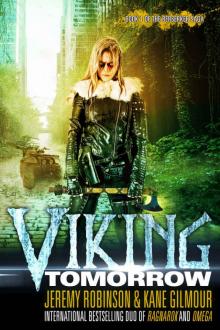 Viking Tomorrow
Viking Tomorrow Project Legion (Nemesis Saga Book 5)
Project Legion (Nemesis Saga Book 5) BENEATH - A Novel
BENEATH - A Novel Kronos
Kronos SecondWorld
SecondWorld XOM-B
XOM-B Forbidden Island
Forbidden Island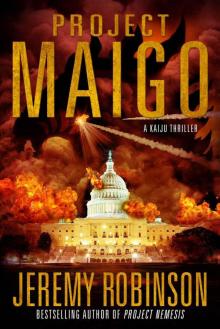 Project Maigo
Project Maigo The Last Hunter - Descent (Book 1 of the Antarktos Saga)
The Last Hunter - Descent (Book 1 of the Antarktos Saga) Jack Sigler Continuum 1: Guardian
Jack Sigler Continuum 1: Guardian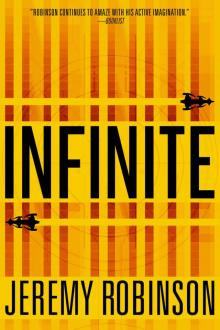 Infinite
Infinite Project Hyperion
Project Hyperion The Distance
The Distance The Divide
The Divide The Last Hunter - Ascent (Book 3 of the Antarktos Saga)
The Last Hunter - Ascent (Book 3 of the Antarktos Saga) The Last Hunter - Pursuit (Book 2 of the Antarktos Saga)
The Last Hunter - Pursuit (Book 2 of the Antarktos Saga) Raising the Past
Raising the Past The Others
The Others The Last Hunter - Collected Edition
The Last Hunter - Collected Edition Threshold
Threshold Blackout ck-3
Blackout ck-3 Antarktos Rising
Antarktos Rising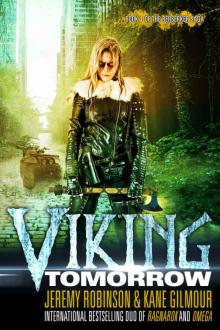 Viking Tomorrow (The Berserker Saga Book 1)
Viking Tomorrow (The Berserker Saga Book 1)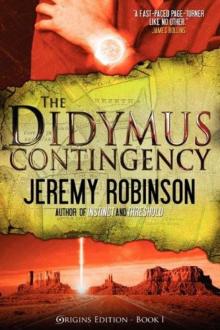 The Didymus Contingency
The Didymus Contingency Savage (Jack Sigler / Chess Team)
Savage (Jack Sigler / Chess Team) Prime
Prime Insomnia and Seven More Short Stories
Insomnia and Seven More Short Stories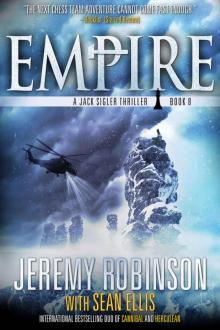 Empire (A Jack Sigler Thriller Book 8)
Empire (A Jack Sigler Thriller Book 8)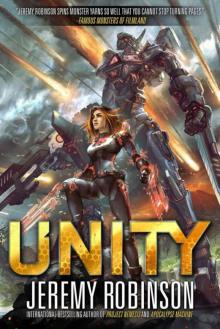 Unity
Unity Instinct
Instinct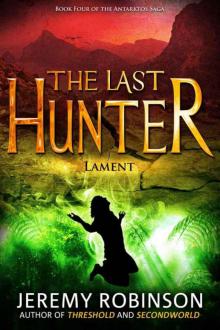 The Last Hunter - Lament (Book 4 of the Antarktos Saga)
The Last Hunter - Lament (Book 4 of the Antarktos Saga)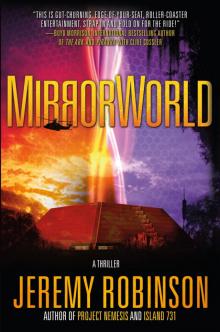 MirrorWorld
MirrorWorld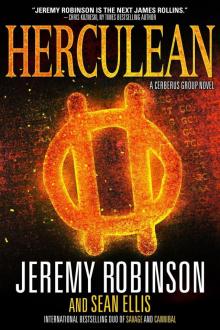 Herculean (Cerberus Group Book 1)
Herculean (Cerberus Group Book 1) Island 731
Island 731 Omega: A Jack Sigler Thriller
Omega: A Jack Sigler Thriller Patriot (A Jack Sigler Continuum Novella)
Patriot (A Jack Sigler Continuum Novella)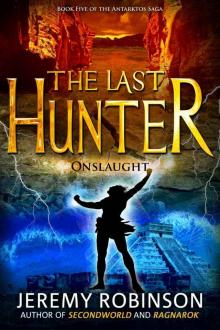 5 Onslaught
5 Onslaught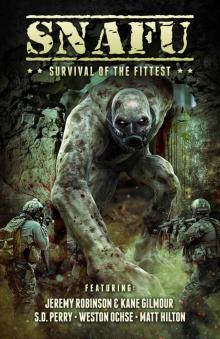 SNAFU: Survival of the Fittest
SNAFU: Survival of the Fittest Helios (Cerberus Group Book 2)
Helios (Cerberus Group Book 2)